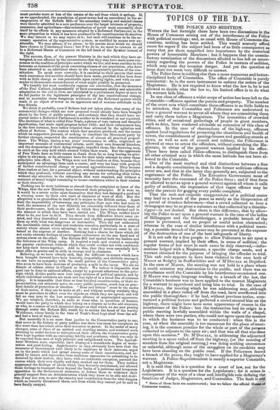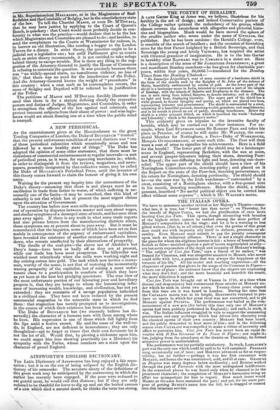TOPICS OF THE TAY.
THE POLICE AND SEDITION.
Wrrnix the last fortnight there have been two discussions in the House of Commons arising out of the interference of the Police with political meetings ; and, as usual with Rollie of Commons dis- cussions, nothing has been settled. This would scarcely afford cause for regret if the subject had been of as little consequence as many that are there magnified into importance by the oratorical powers of honourable Members : but it happens that the unsatis- factory termination of the discussions alluded to has left an uncer- tainty regarding the powers of the Police in matters of sedition, which may some day occasion danger. And yet the question at issue does not seem very difficult to answer. The Police force is nothing else than a more numerous and better- disciplined body of Constables. The office of Constable is purely ministerial : be is the mere instrument to enforce the orders of the Magistrate. He is not required to know what the law is, he is not allowed to decide what the law is; his limited office is to do what his warrant bids him.
In one class of offences a wider scope of action has been left to the Constable—offences against the person and property. The number of the overt acts which constitute these offences is so little liable to be mistaken, that Constables and Policemen are understood to have a general warrant to arrest all whom they see committing them and carry them before a Magistrate. The necessities of crowded cities, and of occasional gatherings of people in great numbers, such as fairs, have rendered advisable an extension of this class of offences. In the case of obstructions of the highway, offences against local regulations for promoting the cleanliness and health of towns, the establishment of gaming-houses and gambling-stands at races, as well as acts of assault and robbery, the Policeman is allowed at once to arrest the offenders, without consulting the Ma- gistrate, in virtue of the general warrant implied by his office. These have been called Police-offences, to distinguish them from all other criminal acts in which the same latitude has not been al- lowed to the Constable.
One of the most marked and vital distinctions between a free and a despotic constitution is, that in the former seditious offences never are, and that in the latter they generally are, subjected to the cognizance of the Police. The Executive Government must of necessity have the command of the Police force ; and if that force be allowed to act as upon a general warrant against all whom it calls guilty of sedition, the imputation of that vague offence may be made the pretext for gagging every public complaint.
That the rash and culpable exaggerations of a political orator
may lead to a breach of the peace as surely as the vituperation of a parcel of drunken tishwomen—that a crowd collected to hear a demagogue may be as great a nuisance as that collected by a thimble- rigger—is not denied. But there is this difference, that by allow- ing the Police to act upon a general warrant in the case of the ladies of Billingsgate and the thimblerigger, a probable breach of the peace is prevented, and no proper or useful action obstructed ; whereas in the case of similar interference with a political meet- ing, a possible breach of the peace may be prevented at the expense of the destruction of one of the best safeguards of liberty.
It is not safe for a free people to allow Policemen to act upon a
general warrant, implied by their office, in cases of sedition : the regular forms of law must in such cases be duly observed,—infor- mations lodged with a Magistrate, a specific charge made, and a warrant obtained for the purpose of bringing the offender to trial. This safe rule appears to have been violated in the case both of Mesos at Sedgley in Staffordshire and of M'Dotram, at Deptford. In the case of MAsoti, the meeting was not held in a place where it could occasion any obstruction to the public, and there was no disturbance until the Constable by his interference occasioned one. If MASON was using language tending to a breach of the law, the Constable's business was to have applied to the nearest Magistrate for a warrant to apprehend and bring him to trial. In the case of M'Dousla., the meeting which he was addressing may, although assembled in a place railed off from the road, have overflowed into the public thoroughfare : if he had, without previous notice, com- menced a political lecture and gathered a crowd around him on the highway, there might have been some appearance of reason in the interference of the Pollee: but the transaction had its origin in a public meeting lawfully assembled within the walls of a chapel, where there were two parties, who could not agree upon the manner in which the business was to be conducted : when this is the case, or when the assembly is too numerous for the place of meet- ing, it is the common practice for the whole or part of the persons collected to adjourn to the open air; and that was all that was done upon this occasion.* Dr. M'DotrALL, in addressing the adjourned meeting in a space railed off from the highway, (or the meeting of seceders from the original meeting,) was doing nothing uncommon or unlawful, although some of the stragglers on its outskirts may have been standing on the public road. If the Policemen feared a breach of the peace, they ought to have applied for a Magistrate's warrant. A Police-Superintendent is merely a superior Constable, not a Magistrate. It is said that this is a question for a court of law, not for the Legislature. It is a question for the Legislature ; for it arises in consequence of the want of a clear and intelligible rule defining the functions of Judges, Magistrates, and Constables. The fault is pt • Some of these facts are controverted; but we follow the official liammof
Commons version. ,
in Mr. Superintendent MALLex.ren, or in the Magistrates of Staf- fordshire and the Constable of Sedgley, but in the unsatisfactory state of the law. To tell the Chartist Meson, or even Dr. M'DonALL, that he may have justice by applying to the Court of Queen's Bench, is quackery : that Court would most probably decide in con- formity to what was the practice—would declare that to be the law which Magistrates and Constables are pleased to do ; and besides, to send the complainers to the Courts at Westminster for redress, is, to borrow an old illustration, like sending a beggar to the London Tavern for a dinner. In strict theory, the question ought to be a judicial not a legislative one ; but until Parliament give us courts such as strict theory recommends, it is not entitled to take refuge behind theory to escape trouble. Nor is there any thing in the sug- gestion of the Attorney-General to justify the House of Commons in refusing to entertain the question. It was precisely because there was "no widely-spread alarm, no tumultuous violence, no loss of life," that there was no need for the interference of the Police. And the Attorney-General knows the weight of " precedents " in this country : when a case such as he contemplates occurs, the eases of Sedgley and Deptford will be referred to in justification of the Police.
The petitions of MASON and M'Donsx.r. forcibly illustrate the need that there is for a statqte defining clearly the respective powers and duties of Judges, Magistrates, and Constables, in order to strengthen the officers of the law against real criminals, and protect innocent subjects from their abuse of power : and wise le4is- Igor, would set about framing one at a time when the public mind is tranquiL



























 Previous page
Previous page